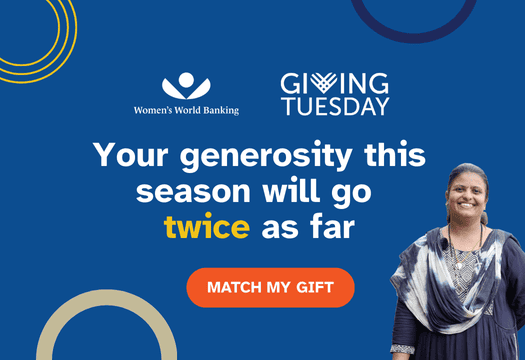To celebrate Women’s World Banking’s 45th anniversary, we are showcasing the voices of individuals from around the world who have shaped and touched the Women’s World Banking journey since its inception in 1979 at Commission on the Status of Women till today.
These are stories from across Women’s World Banking’s reach, from women we serve and our customers, to allies and women in leadership who have contributed to women’s economic empowerment and financial inclusion.
Meet Ibu Lenny Rosalin. She is a pioneer for women’s empowerment, and child protection in Indonesia. With a career spanning decades in government service, Ibu Lenny’s work is driven by a simple understanding that “Women’s economic empowerment will have an impact on the collective well-being thus having a multiplier effect” across the population.
Ibu Lenny began her career as a government employee in 1987, working for 22 years at Bappenas, The Ministry of National Development Planning. In 2008 she joined The Ministry of Women Empowerment and Child Protection. There, she first served as the Deputy Minister for the Fulfillment of Children’s Rights and later as the Deputy Minister for Gender Equality.
Her transition to this role fueled the realization that, despite Indonesia’s ratification of the Convention on the Elimination of All Forms of Discrimination Against Women (CEDAW) in 1984, the Convention on the Rights of the Child in 1990 and other significant milestones, women in Indonesia continue to face major challenges. Indonesia has the fourth-largest population of unbanked women globally, with around 49 million lacking an account.
A Collaborative Approach for Addressing Challenges in Financial Inclusion
One of the central themes in Ibu Lenny’s work to address these challenges has been financial inclusion, which she views as a crucial aspect of broader women’s empowerment. “Women’s economic empowerment will have an impact on the collective well-being”. This impact isn’t just limited to women; it extends to children, families, and communities, creating a ripple effect of positive change.
However, accessing financial services is a major hurdle, often compounded by a lack of understanding among women about the importance of formal financial products. This is not just a financial literacy issue but also about how financial institutions provide information and design their products. Ibu Lenny says “Women have needs and challenges that are different from men,” highlighting the necessity for financial services to be more accessible and tailored to women’s unique circumstances.
Recognizing the complexities of these challenges, Ibu Lenny in 2022, spearheaded a Coalition in partnership with Women’s World Banking in coordination with the Coordinating Ministry for the Economy.
For Ibu Lenny, the success of this initiative lies in collaboration. “We realize that in order to drive change and impact Indonesian society, especially for Indonesian women, multi-stakeholder cooperation is needed”. This partnership brought together key players, including Bank of Indonesia, the Financial Services Authority, and the National Development Planning Agency, among others. The approach was strategic in identifying and working with champions who are committed to advancing women’s financial inclusion.
Ibu Lenny’s Vision: Empowering Women to Shape the Future of Finance
Ibu Lenny puts that “Women’s issues are very complex, and women’s economic empowerment is the main goal of financial inclusion for women. Achieving this goal requires more than just providing access to financial services; it demands that women are actively involved in every stage of the decision making process.”
From designing financial products to shaping policy, women must have equal opportunities to participate and influence these decisions. This is not just about offering control, but ensuring that the policies, programs, and activities genuinely benefit women. The guiding principles for her are : Access, Participation, Control, and Benefits (APCB).
As we look to the future, the challenge is not just to include women, but to empower them to lead and shape the financial landscape.
Women’s World Banking has changed the lives of millions of women, transforming their households, businesses and communities, and driving inclusive growth globally through financial inclusion.
Today, using our sophisticated market and consumer research, we turn insights into real action to design and advocate for policy engagement, digital financial solutions (see Blanca’s story here), workplace leadership programs, and gender lens investing.
Help us reach the nearly billion women still excluded from the formal financial system. Donate now.




